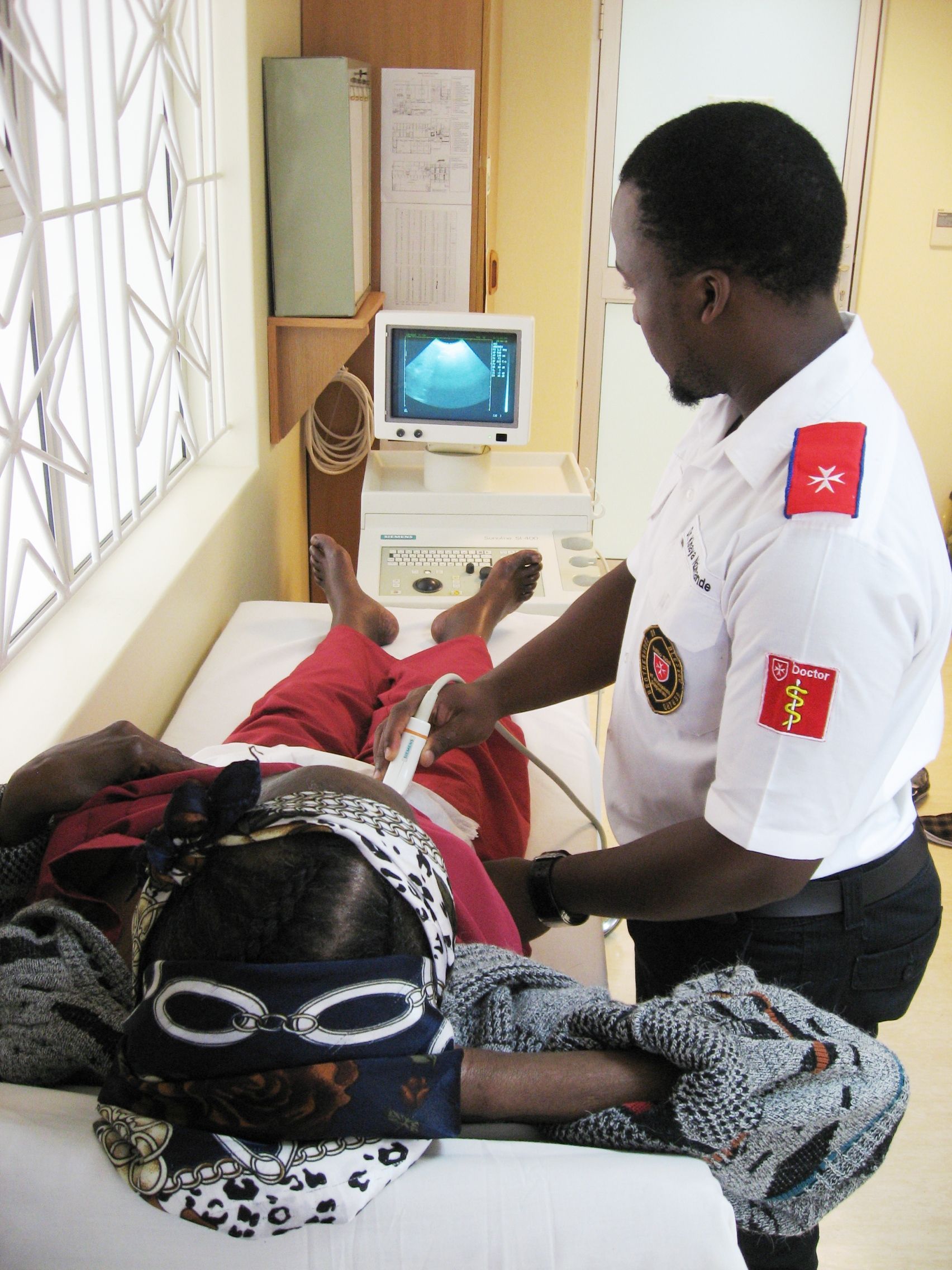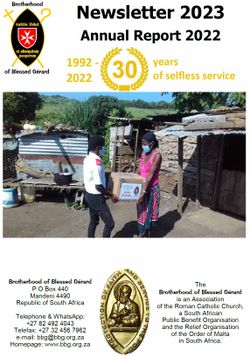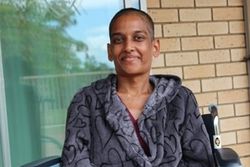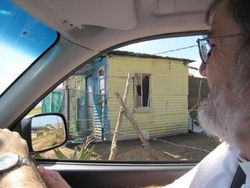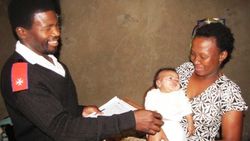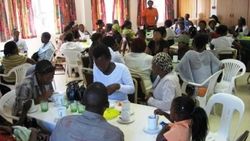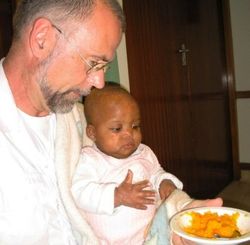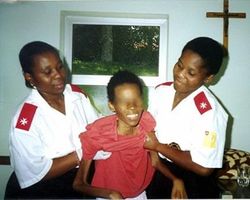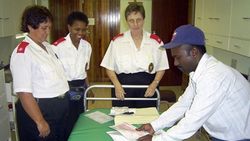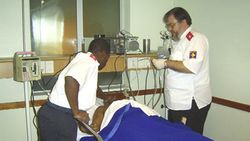Our AIDS treatment programme HAART (Highly Active Anti-Retroviral Therapy)
The HAART programme offers comprehensive holistic help:
Voluntary Counselling and HIV Testing (VCT)
We offer free and confidential HIV Tests to the general public.
Therapy preparation
Before starting treatment, each patient is given intensive information about HIV and AIDS and about what is necessary on their part to ensure the success of treatment.
Antiretroviral Treatment
We provide free Highly Active Anti-Retroviral Treatment (HAART) as comprehensive medical care including
- regular medical examinations,
- blood monitoring,
- on-going prevention or treatment of opportunistic infections,
- medical and psychosocial counselling
- and dispensing of the medication.
Adherence Monitoring
Our Therapeutic Counsellors make home visits to our patients on ARV treatment to ensure that they adhere to the treatment and so prevent treatment failure.
This enables us to discover adverse drug reactions early and to prevent problems.
Social care and livelihood support
We advise our patients on social problems and how to secure their livelihood. We motivate them to actively strive for their livelihood and not to rely solely on the care provided by relatives or service providers. Our goal is to enable a self-sufficient, independent life with the disease.
HIV/AIDS in South Africa
South Africa - like all countries in Africa - has an AIDS problem of catastrophic proportions.
As early as 2007, the South African Department of Health conducted a survey of pregnant women. According to this, 28% of the women were HIV-positive, with the rate being highest in KwaZulu-Natal with 37.4% and lowest in the Western Cape with 12%. Based on a questionnaire survey in South African households in 2008, the rate was 10.9%. Women between the ages of 25 and 29 were most affected, with 32.7% of them being HIV-positive. Among men, 25.8% of those aged 30 to 34 had the virus. In 1997, the number of AIDS deaths was 316,000. In 2006, there were 605,000 deaths. The number of annual deaths had thus doubled within 10 years.
Source: www.suedafrika.net
Baseline:
Every day 6 babies die of AIDS in our province of kwaZulu/Natal.
4000 people per day are infected with HIV in southern Africa
20% of women who came for antenatal examinations in kwaZulu/Natal in 1995 were HIV positive.
(Source: Sunday Tribune, 23 February 1997)
Current figures/statistics
In some areas of Zululand, 88% of the total population is HIV-positive and statistics do not know about the number of unreported cases.
Migrant labour undermines marital fidelity.
Those who lack the money to pay the bride price (11 cattle) often resort to premarital sexual relations.
Urbanisation also leads to alienation from moral values.
Polygamy and promiscuity do the rest.
Those who see ancestral spirits or spells as causes of disease and sacrifices or counterspells as their cure have little to do with human immunodeficiency viruses and their dangers.
The vicious circle
There is a lot of poverty here with us. Poverty means that people cannot afford to eat well. So naturally their body's resistance is low. Then the virus can attack them very easily. That is a very significant fact. Of course, what causes poverty is unemployment. Many of the factories have closed down, but many of their former workers are still there. They have no work, so they are poor and cannot find a living. This causes the vicious circle of "poverty - malnutrition - immunodeficiency - high infection rate".
I think that people with HIV and AIDS suffer most from loneliness. They live in isolation because they are different, branded by the disease. Sometimes they are even shunned or shunned by their own family because they are ashamed of the disease or afraid of getting infected. Although nowadays everyone knows how AIDS is spread and how it is not spread, there is still a lot of misinformation and misbeliefs about this disease, for example that you can catch it from shaking hands.
All these misconceptions and ignorance increase the isolation of patients.
Reports from the AIDS-Hilfe
Reshma (2021)
Reshma reports: Last February I was tested and found out that I was HIV positive.
mehrAids war in paradise
During the journey through the slums, Father Gerhard and his brother are confronted with pure poverty.
mehrAIDS treatment saves lives - February 2011
AIDS treatment saves lives
Highly Active Anti-Retroviral Therapy (HAART) can completely change the life of an AIDS patient who would otherwise be doomed to die soon, allowing him or her to continue…
mehrWorld AIDS Day Newsletter - 1 December 2009
Today we celebrate World AIDS Day.
Everywhere and from all sides, countless statements, comments, demands and verbal or electronic expressions of sympathy are being published, but only very few are…
mehr5 Years of Blessed Gérard's Hospice HAART Programme Service - 11 October 2009
5 Years of Blessed Gérard's Hospice HAART Programme Service
On 5 August 2003, BBC Newsnight broadcast the programme "BBC Newsnight 5 August 2003: Hilary Andersson reported from the first national AIDS…
mehr15 years of Blessed Gérard's HIV/AIDS Awareness Programme ministry - 11 October 2009
15 years of service of Blessed Gérard's HIV/AIDS Awareness Programme
In 1994, our newsletter said: "Eighteen members of our fraternity participated in a course for trainers in AIDS prevention,…
mehrThe great hope in the fight against AIDS - The HAART Clinic - August 2009
AIDS patients are treated through the HAART programme, the use of highly effective antiretroviral drugs. By taking these drugs regularly, infected people can live up to 25 years longer in good health.…
mehrFeast of Life - 1 December 2007
We celebrated World AIDS Day with a "Celebration of Life" for all our patients on HAART.
A large group of 70 patients came to the celebration. This is more than half of all our patients in the HAART…
mehrLindani - September 2007
Lindani*, a little girl, was brought to us by her mother. She had the "usual" symptoms, like diarrhoea and vomiting. The little girl does not look well and is quite weak. In addition, her skin is…
mehr"What did I do to deserve this?" - Christmas 2005
What most people do not see.
Mpume was 16 years old and a very pretty girl; she lived with her mother, her three siblings and three cousins - the children of her late aunt - in the vast hilly…
mehrMandeni is the AIDS stronghold of the world
In 1997, the township of Sundumbili in Mandeni was described in the South African magazine Drum as the "AIDS capital of KwaZulu/Natal". A representative test among factory workers in the iSithebe…
mehrThe story of Qalile Uhlelo - Christmas 2004
Qalile Uhlelo*, a 39-year-old woman, came to Blessed Gérard's Hospice in August 2004 asking for help. She was very ill and had all kinds of opportunistic infections. She openly admitted that she was…
mehrBlessed Gérard's Hospice HAART Programme SACBC, CRSC & PEPFAR - Christmas 2004
Blessed Gérard's Hospice HAART (Highly Active Anti-Retroviral Therapy) programme, a joint project of Blessed Gérard's Hospice and the South African Bishops' Conference has developed and matured over…
mehrThe story of Ngapumelela Ngosizo - Christmas 2004
An unconscious patient with tuberculosis and meningitis was admitted to Blessed Gérard's Hospice in 1999. He came from a very caring family who had employed a helper to care for him. This was…
mehrBlessed Gérard's Hospice will start antiretroviral treatment for HIV/AIDS patients as early as 2004!
We could not believe our own ears when Johan Viljoen, the project manager of the AIDS Secretariat of the South African Catholic Bishops' Conference, called us in September 2003 to say that the…
mehrIf only I had said NO - Easter 1999
(This is a short story written with the intention of drawing attention to the disaster facing our area and representing the work of Blessed Gérard's Care Centre & Hospice).
This story is based on…
mehrAIDS and traditional healing methods -July 1998
About half of AIDS patients suffer from pulmonary tuberculosis. Many refuse to take medication out of a lack of understanding that this is really necessary.
mehrAIDS and traditional healing methods - July 1998
What is worrying is that many Zulu in the local area trust their traditional medicine men more than modern medicine. This would not be a big deal if they were only taking herbal substances that can…
mehrBlessed Gérard's Hospice: The right project in the right place at the right time.
Bericht vom Juli 1998
mehrFrom our newsletter of Easter 1998
Blessed Gérard's AIDS Awareness Programme
Our AIDS prevention programme will also be utilised more through the iSithebe AIDS Forum. Our Chief Medical Officer, Dr. P. Z. T. Thabethe has been asked to…
mehrFrom our newsletter of August 1996
OUR AIDS PREVENTION PROGRAMME CONTINUES
Dr Thabethe, our medical director, and all the active members who have been trained as AIDS awareness trainers have been extremely active during the last few…
mehrWorld AIDS Day - 1995
1 December 1995 was World AIDS Day.
We, the Brotherhood of Blessed Gérard, under the auspices of Dr Thabethe, tried to make the local communities aware of the danger of contracting the HIV virus.
To…
mehrFrom our newsletter of December 1994
AIDS PREVENTION PROGRAMME
Eighteen members of our fraternity participated in a course for trainers in AIDS prevention, which was organised with the help of our Diocesan AIDS Team. Although we enjoyed…
mehr